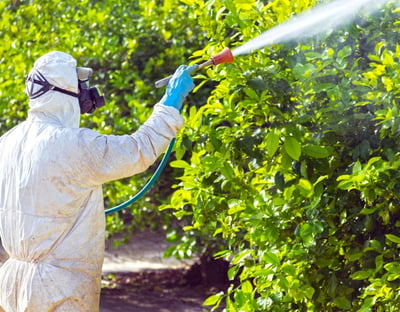
Home / Here on Earth / Plant Health Management: Big Impact of a Little Known Science
We may not think about it as often as we should, but plants rule the world.
Agriculture, forestry, and biodiversity have major impacts on our everyday lives, and all are reliant on the stability of our plant life. Despite the importance of keeping them safe, few are aware of the intricate science known as Plant Health. We're taking a deeper dive into one of the most impactful agronomic sciences.
What is Plant Health?
.jpg?width=400&height=297&name=DTEL-%20Blog%20(21).jpg)
Plants face dangers from every direction. Pests, diseases, weeds, natural predators, and humans are all major threats to Plant Health and the ecosystems they make up. The study of these relationships and the active goal of protecting and overcoming these obstacles is Plant Health. While Plant Health is a newer concept, keeping plants safe is an idea as old as agriculture.
Since the dawn of time, humans realized we needed to keep an eye on our crops, and everything around them, if we wanted to have good food. As we progressed, we also realized that even the plants we don’t eat have major effects on our health and ecosystem. This led to the eventual, although relatively recent, creation of Plant Health Management, a science focused on protecting plants using cutting-edge, scientific methods.
Plant Health & Integrated Pest Management
One of the major threats to plants is pests such as insects and disease. While plants have evolved natural processes to deter or deflect damage from pests, not all plants are under optimal conditions. However, using Integrated Pest Management, professionals can use plants' natural processes to prevent damage and solve pest problems.
While Integrated Pest Management (IPM) is an older science than Plant Health, they share a close relationship. IPM is concerned with integrating natural processes to play defense or offense against pests and pathogens.
In the Strawberry farming industry, the Two-Spotted Spider Mite was devastating crops, draining juice from the berries, and disrupting photosynthesis. The Spider-Mite quickly became immune to pesticides, and chemical applications became worthless. In a last-ditch effort, the farmers adopted an IPM program, introducing the Persimilis Mite, the natural predator of the Spider-Mite. Once introduced, the Persimilis devoured the Spider-Mites and their eggs, and once they had devoured all their favorite, and only prey, the Persimilis itself dies, and the strawberries are safe.
disrupting photosynthesis. The Spider-Mite quickly became immune to pesticides, and chemical applications became worthless. In a last-ditch effort, the farmers adopted an IPM program, introducing the Persimilis Mite, the natural predator of the Spider-Mite. Once introduced, the Persimilis devoured the Spider-Mites and their eggs, and once they had devoured all their favorite, and only prey, the Persimilis itself dies, and the strawberries are safe.
While IPM is the most environmentally friendly option for pest control, it's not recommended for non-professionals, as improper IPM practice can be as devastating as no pest control at all.
Plant Health and People
While humans depend on agriculture, clearing forests for farms isn't always a good thing. The connection between biodiversity and human health is only recently coming to light. As humans expand their reach into the far corners of the world, we expose the world to our pathogens, and the plants we encounter do the same. As we clear vegetation to make way for our cities and farms, we unknowingly destroy plant species and create gaps in the food chain.
If you’ve ever had to take a science class or seen The Lion King, you know that the circle of life is a delicate thing. By removing a single species of plant from an ecosystem, this food chain shatters. As small animals lose access to the plants they eat, the top of the food chain slowly begins to suffer. As we expand our reach, it’s important to consider plant health not just with the plants in our backyard but with the ones all around us.
How You Can Practice Plant Health in Your Landscape?
.jpg?width=400&height=297&name=DTEL-%20Blog%20(31).jpg)
Having an integrated and symbiotic relationship with your landscape may not be your first thought when getting it installed. However, make sure that your landscape is full of healthy native plants is one of the first steps to ensuring optimal Plant Health. Monitoring your plants, tracking their status, and watching out for invasive species or pest symptoms can help you get a head start by protecting your plants from harm.
If you have a landscape company, ask about their Plant Health Management and how they plan to execute it on your property. You may want to go it alone, but the damage you can cause with improper IPM or Plant Health Management is significantly more expensive than hiring a professional.
If you’re looking for experts in Plant Health and Integrated Pest Management, Down To Earth has ones standing by for you. Get a free evaluation of your property by a landscape professional who can tell you your problem areas, identify invasive plants or symptoms of pathogens, and provide a comprehensive landscape report, all completely free. For your hassle-free consultation, click here.
